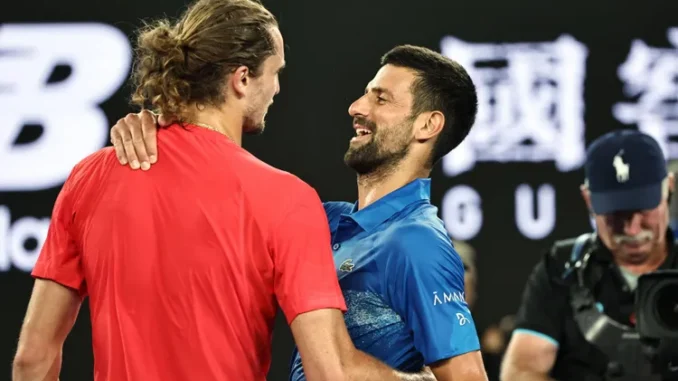
The 2025 Wimbledon Championships have been a whirlwind of surprises, with a record 36 seeded players falling in the first two rounds, but off the court, a powerful moment of camaraderie has stolen the spotlight. Novak Djokovic, the 24-time Grand Slam champion, has offered heartfelt support to Alexander Zverev after the German star’s candid admission of mental health struggles following a shocking first-round exit. Zverev’s 6-7(3), 7-6(8), 6-3, 6-7(5), 6-4 defeat to Arthur Rinderknech, ranked No. 72, marked his earliest Grand Slam exit since 2019 and prompted a raw reflection on his emotional state. “I feel very alone out there at times,” Zverev confessed post-match. “I’ve never felt this empty before. Just lacking joy in everything that I do.” Djokovic, no stranger to the pressures of professional tennis, responded with empathy, reinforcing the growing conversation about mental health in the sport.
Zverev, the world No. 3, has endured a rollercoaster 2025 season. After reaching the Australian Open final, where he fell to Jannik Sinner, his form faltered with early exits in Buenos Aires, Rio de Janeiro, Indian Wells, and Miami. His Wimbledon loss, a grueling four-hour, 40-minute battle, amplified his struggles, as he admitted to feeling “quite alone in life at the moment.” The 28-year-old, who has faced significant off-court challenges, including domestic abuse allegations he denies, hinted at seeking therapy for the first time. “Maybe for the first time in my life I’ll probably need it,” he said, acknowledging the toll of constant travel, media scrutiny, and the solitary nature of tennis. His vulnerability struck a chord, echoing sentiments shared by players like Naomi Osaka, Andrey Rublev, and Iga Swiatek, who have championed mental health awareness.
Djokovic, advancing to the third round with a 6-3, 6-2, 6-0 rout of Dan Evans, spoke warmly of his bond with Zverev. “Sascha and I have a great relationship. I like him a lot as a person. We talk quite a bit actually about tennis and different topics in life as well,” he said. Their connection goes beyond casual locker-room chats; before Wimbledon, they shared a practice session where Zverev sought technical advice. Djokovic’s support was unequivocal: “I understand exactly what he’s going through because I’ve been through that many times where you feel empty or less joy or less happiness playing.” He praised Zverev’s courage for speaking out, noting, “I know mental health is a topic that hasn’t been much talked about in the tennis world before. But I think it deserves more attention. I salute the players who have the courage to come out and speak about that. I definitely wish him all the best. If he needs me, I’m here.”
The tennis world rallied around Zverev, with world No. 1 Aryna Sabalenka offering advice drawn from her five-year experience with therapy. “It’s really important to be open and to talk about what you’re experiencing, because if you’re going to keep it inside, it’s just going to destroy you,” she said after her second-round win. Carlos Alcaraz, the defending champion, also empathized, sharing, “I’ve felt down a lot of times on the court and in tournaments. For me, it’s about having fun playing tennis, not thinking about the result.” The collective response highlights a shift in tennis, where vulnerability is increasingly embraced. Zverev’s £66,000 prize for his first-round appearance, part of Wimbledon’s £53.5 million purse, offers little solace as he prepares for the Gstaad Open, aiming to rediscover his spark.
Djokovic’s gesture underscores his role as a mentor, a reputation bolstered by his support for players like Medvedev, Kyrgios, and Osaka. “He knows he can always reach out to me,” Djokovic reiterated, a sentiment echoed by Zverev earlier this year after Djokovic’s Australian Open retirement due to injury. “There’s no guy on the tour that I respect more than Novak,” Zverev said, recalling hours-long conversations during tough times. As Djokovic chases a record-tying eighth Wimbledon title and Zverev seeks to heal, their bond reflects the sport’s evolving culture—one that values compassion as much as competition.
Leave a Reply